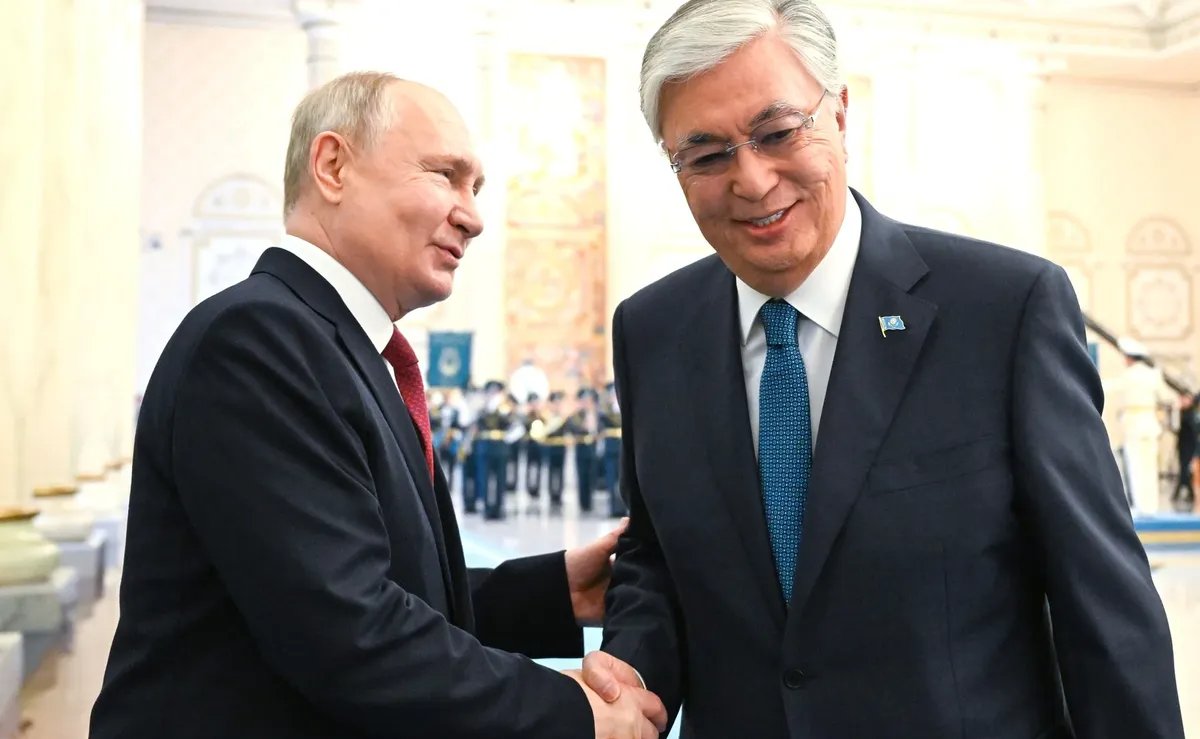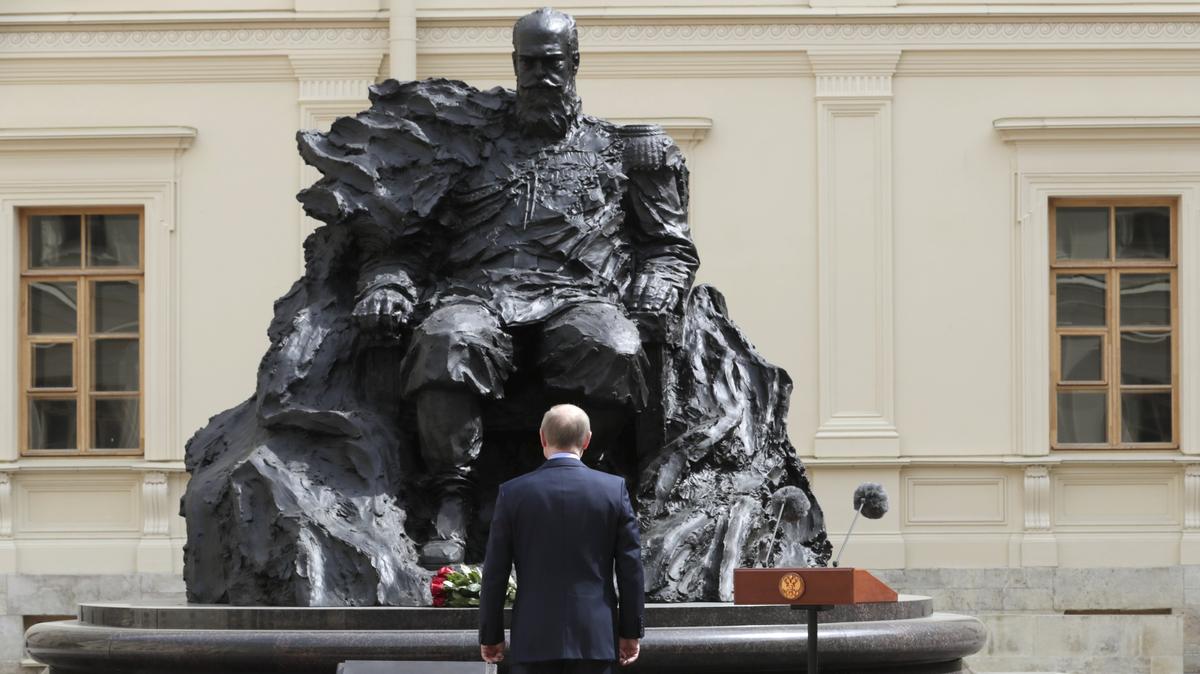We Russians are a kind and compassionate people and can empathise with anyone. Even Putin! We know how hard he works to make us happy and that he doesn’t sleep at night. Some say he is lonely and has nothing to keep him entertained bar bombing Ukraine.
The loneliness part is true! At Easter it’s just him and the cake, which makes sense — his life is of utmost value to Russia and the whole world and so he can’t let anyone get too close, even if ordering all that special furniture does come at extra expense. We don’t mind the money. We just want him to be well. Even those close to you might want to bump you off.
Yes, he goes and meets his people, fishermen or builders, say, but look closely and it’s always the same ones, just with a few more years and awards to their name. If only Gandhi was still alive! But he isn’t. And — between you and me, of course — we don’t know whether Gandhi would talk to him. And there’s an acute lack of foreign leaders available — you can’t meet Kim Jong Un every week. OK, so Hamas will sometimes pop by for a visit, but still, it gets lonely.
But say that and you fail to appreciate his intense intellectual life. This running the state business has been trundling along for a good while now. It doesn’t need much attention. And delving too deep into everything going on in Russia would frustrate anybody. So Putin has grown into a great scholar in recent years and now devotes all his enormous unspent strength to academic research. And in contrast to Comrade Stalin, who, as a luminary in all areas, paid special attention to linguistics, Vladimir Vladimirovich focuses on history.
He’s forever discovering something new and is only too willing to share it with the people under his command. And, of course, one of those main discoveries is that Lenin created Ukraine, and Russians and Ukrainians are one people who speak the same language.
Ukrainians just spoil it a little.
But now Putin’s research has led him to reassess the role of Alexander Nevsky, the 13th century prince whose victories against the Swedes made him one of Russia’s biggest medieval heroes. Who but Putin could look inside that head and understand that when the prince knelt before Batu Khan, asking for mercy, he was really asking the Golden Horde to protect Russia from the West?
Seriously, though, why is Putin doing all this? First, he really is bored, and history is often of interest to pensioners with too much time on their hands — not real history, of course, but pseudo-history, in Putin’s case courtesy of ultranationalist philosopher Alexander Dugin and conspiracy theorist and historical fantasist Anatoly Fomenko. Nothing changes in that history: the English-speaking world has wanted to destroy the Soviet Union for the last few millennia and they still do. I wouldn’t be surprised if he soon told us that food supplies delivered during the famine orchestrated by the Bolsheviks were also not meant to help the USSR, but were in fact tools to fight it.
Second, his historical research is clearly based on intellectual degradation: if the inability to correctly pronounce the full name of the President of Kazakhstan can be considered trolling (that’s rudeness, to you and me), then his comment that you could put a ping pong table in almost every Russian apartment, or at least on every landing, was all too serious.

Russian President Vladimir Putin with President of Kazakhstan Kassym-Jomart Tokayev, 9 November. Photo: kremlin.ru
After all, Putin lived in normal houses rather than palaces until at least the end of the 1990s. He just forgot what they’re like. If that’s not dementia, it’s something very close to it. Is it any wonder such a primitive understanding of Russian history has formed inside his head?
He also seems to need the discoveries he makes personally. The combination of Ukraine being invented by Lenin and Ukrainians being underdeveloped Russians justifies the war, launched as it was to restore the natural order of things by bringing Ukraine back into the Russian fold. After all, Ukraine cannot exist independently and would inevitably turn into a weapon for the English-speaking world to use against Russia should it be allowed to do so. After all, Peter the Great didn’t conquer anything — he simply “took back what was his” — an example Putin continues to follow today.
This alternative history allows Putin to set petty reality aside and to ignore the country’s problems. Immersing yourself in historical fiction allows you to perceive current events as part of a completely different time scale, where all strategic failures — big and small — become almost invisible.
But Alexander Nevsky is, of course, taking things one step further. As if it weren’t enough that hostility to the West and maybe even thermonuclear war were historically predetermined, they are now the emanation of Russian history in its entirety (not the fantasy and idiocy of a few KGB servicemen untroubled by intellect, as one might think). It is an attempt at a complete reversal of national identity, which, ever since the 19th, or even 18th century, has been built on resistance to the Tatar yoke — but now, it turns out, never existed. It was just an eternal struggle with America all along. Everything really is much more complicated than in the textbooks.
Making Alexander Nevsky the historical be all and end all means denial of the entire Romanov period. The Romanovs were largely Westernisers. All Russian autocrats have agreed with Catherine the Great to some extent that “Russia is a European power”. Slowly but surely, with ebbs and flows, Russia became European over the course of 300 years. It was only superficial to start with. Peter the Great took a lot from the West, but rejected the main thing — the independence of man. But then content began to adapt to form — the Charter to the Gentry [granting land and civil rights] appeared and there were sweeping reforms — the abolition of serfdom, first and foremost. There was the October Manifesto of 1905 that placed limits on autocracy. Yes, the Tsar was forced to sign it, and he tried many times to claw back every inch he gave. But even the Magna Carta wasn’t voluntary, and the kings, not understanding the finality, tried every which way to pretend it didn’t exist.
By October 1917, Russia was already very close to Europe. In one fell swoop the Bolshevik coup put an end to that, resurrecting the Horde in its place to create a country roughly comparable to modern-day Iran.
After the Soviet collapse, Russia recommenced its European trajectory at great speed, trying to make up for the seven decades it lost. Putin isn’t just waging a criminal war and destroying everything achieved in the post-Soviet period. In order to feel powerful and important, he is also erasing Russian history.
Views expressed in opinion pieces do not necessarily reflect the position of Novaya Gazeta Europe.
Join us in rebuilding Novaya Gazeta Europe
The Russian government has banned independent media. We were forced to leave our country in order to keep doing our job, telling our readers about what is going on Russia, Ukraine and Europe.
We will continue fighting against warfare and dictatorship. We believe that freedom of speech is the most efficient antidote against tyranny. Support us financially to help us fight for peace and freedom.
By clicking the Support button, you agree to the processing of your personal data.
To cancel a regular donation, please write to [email protected]

